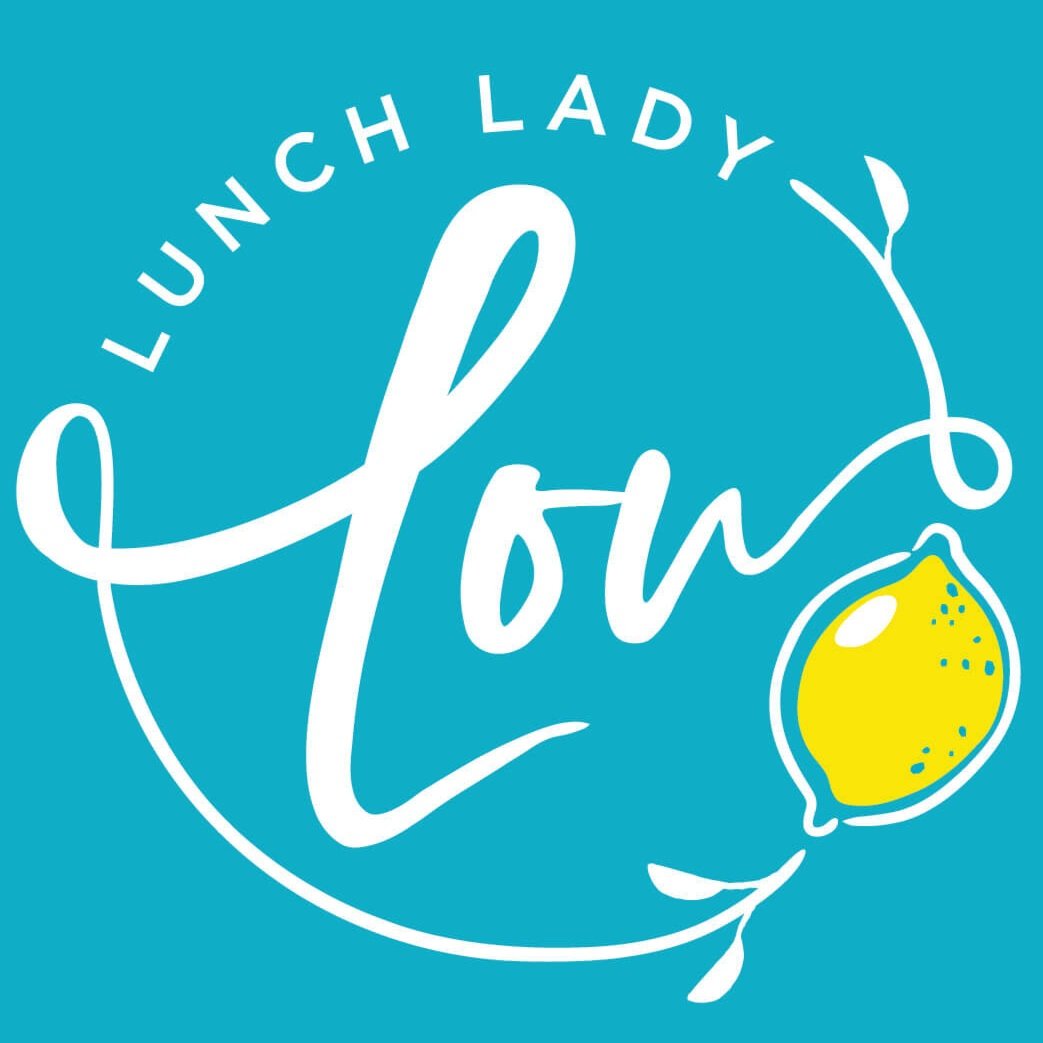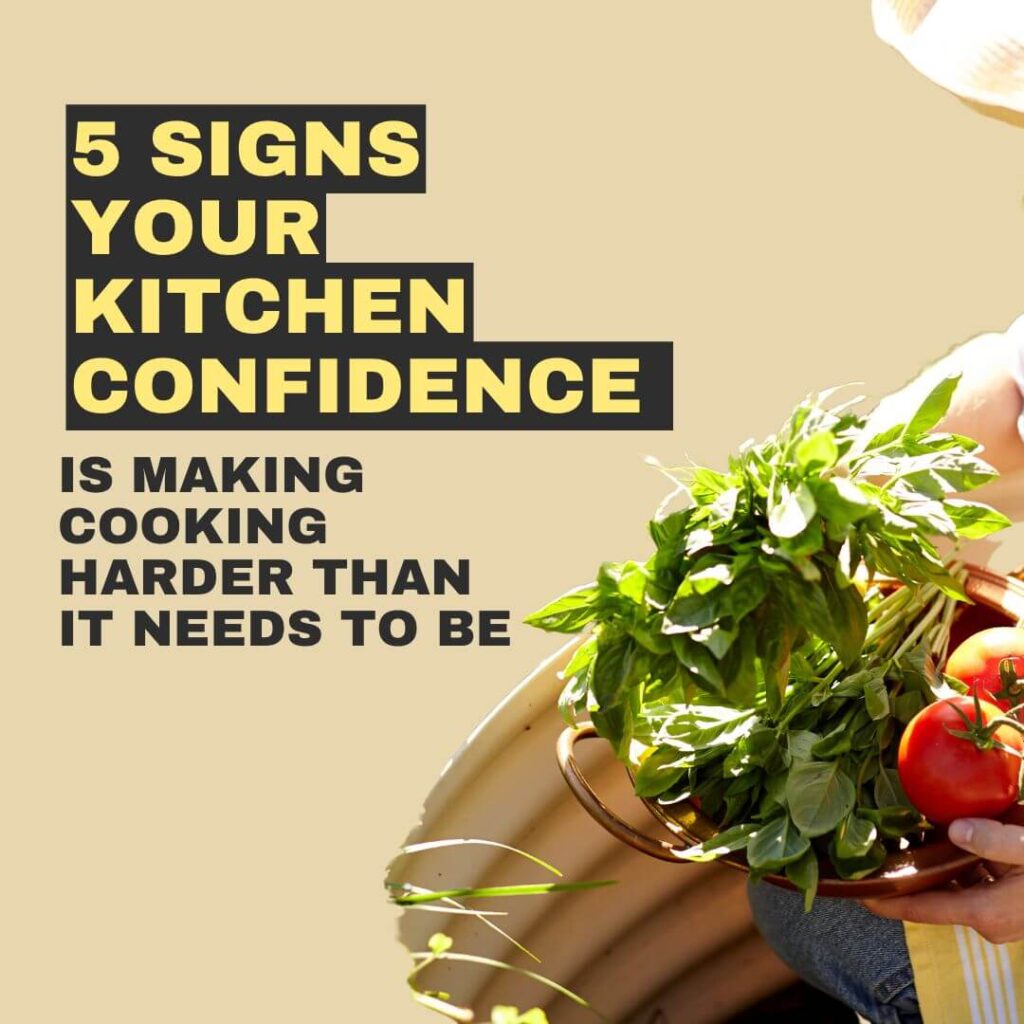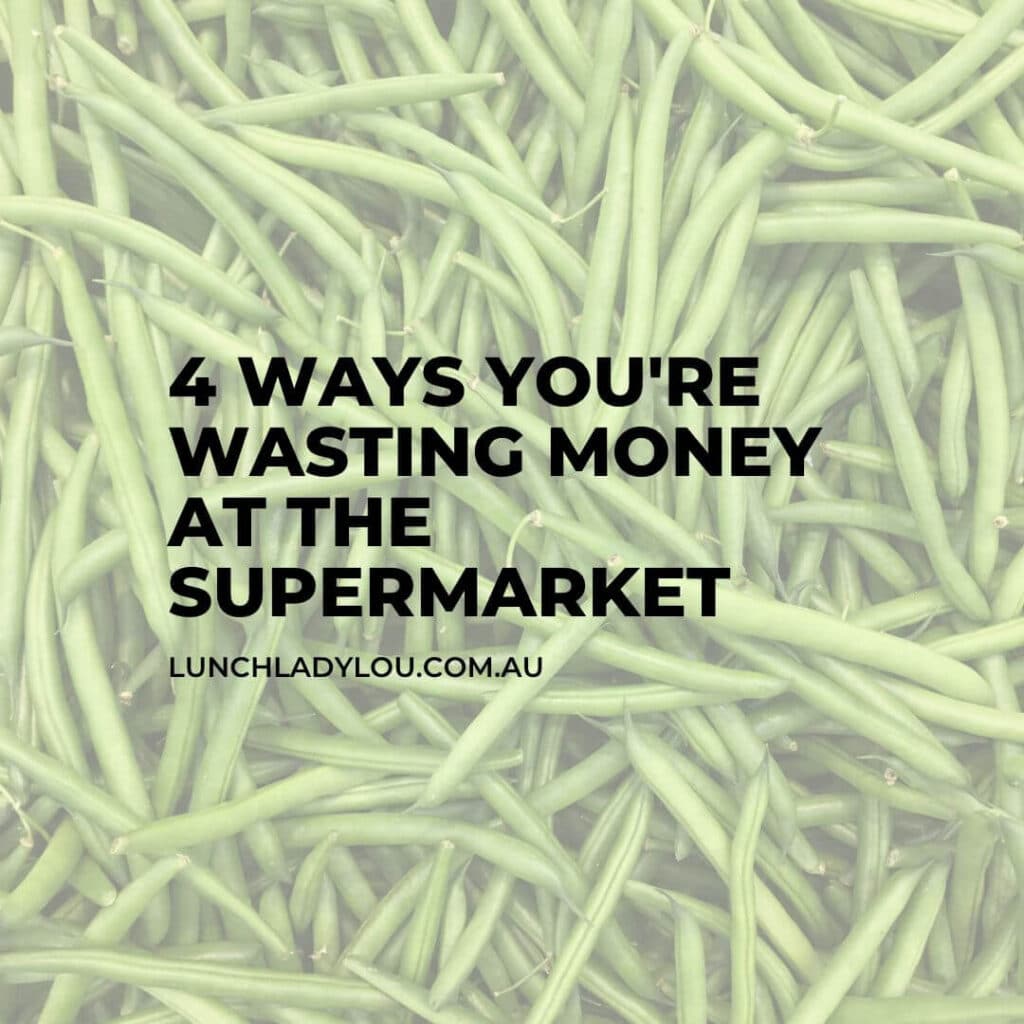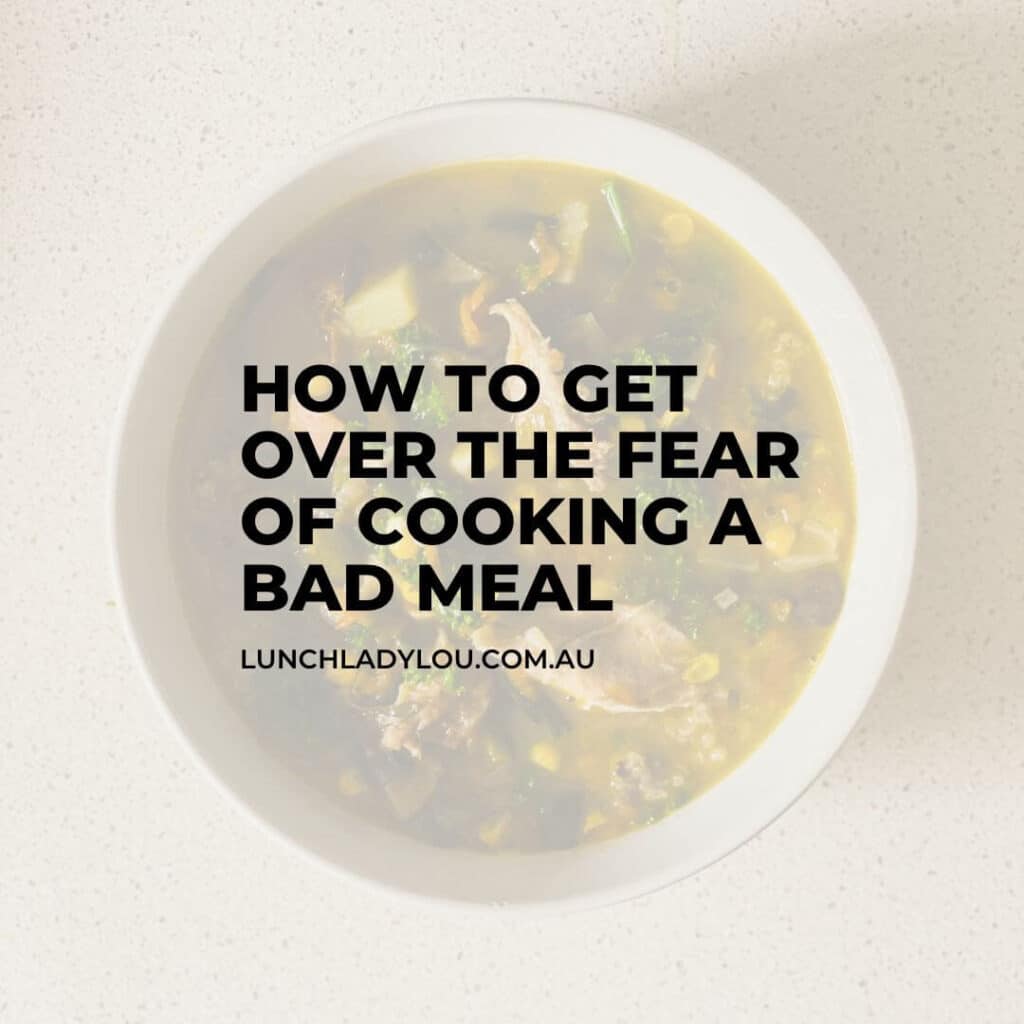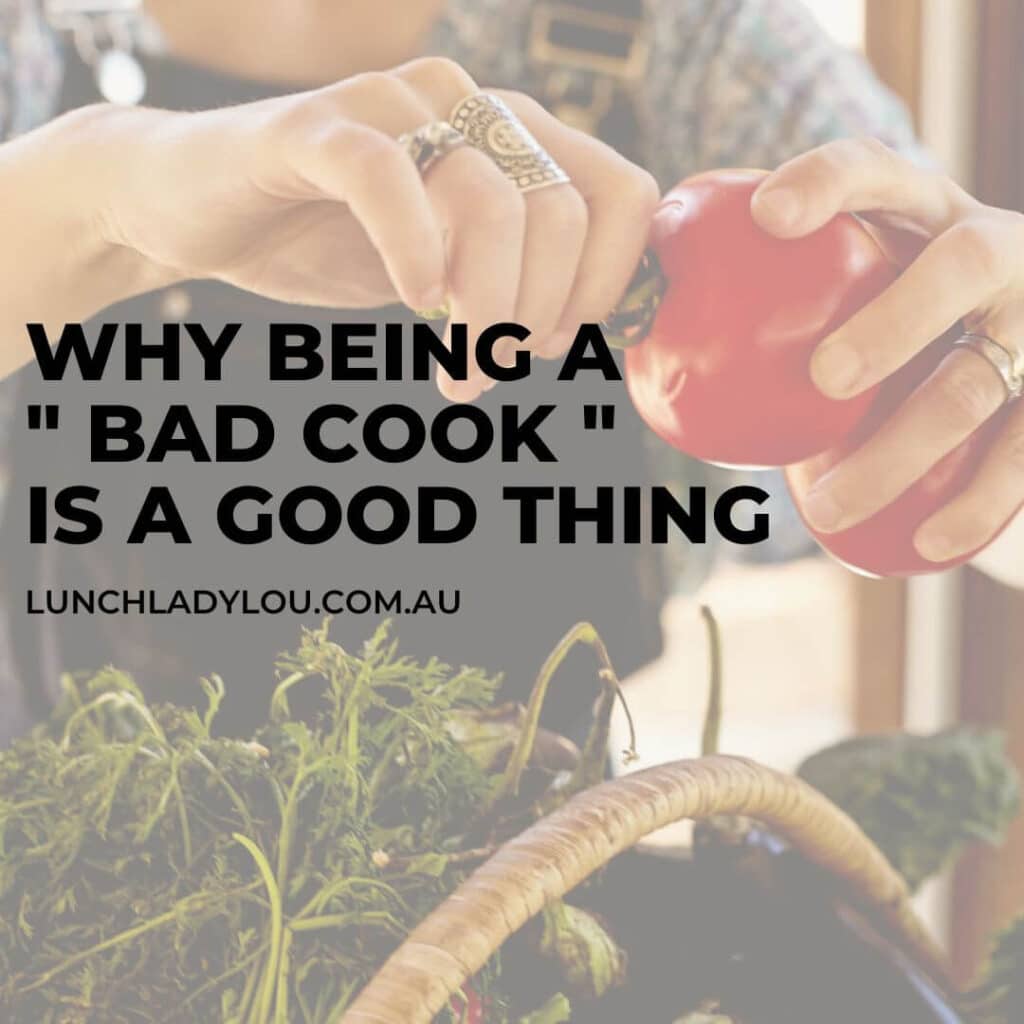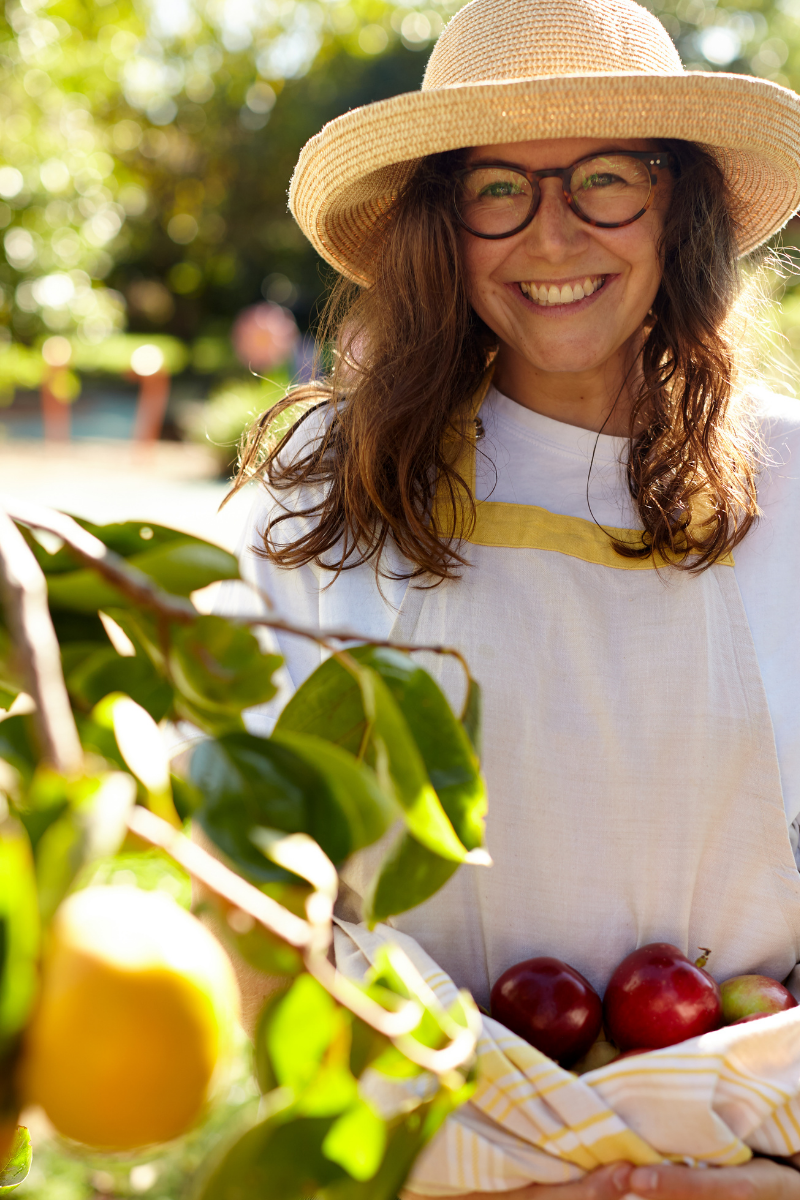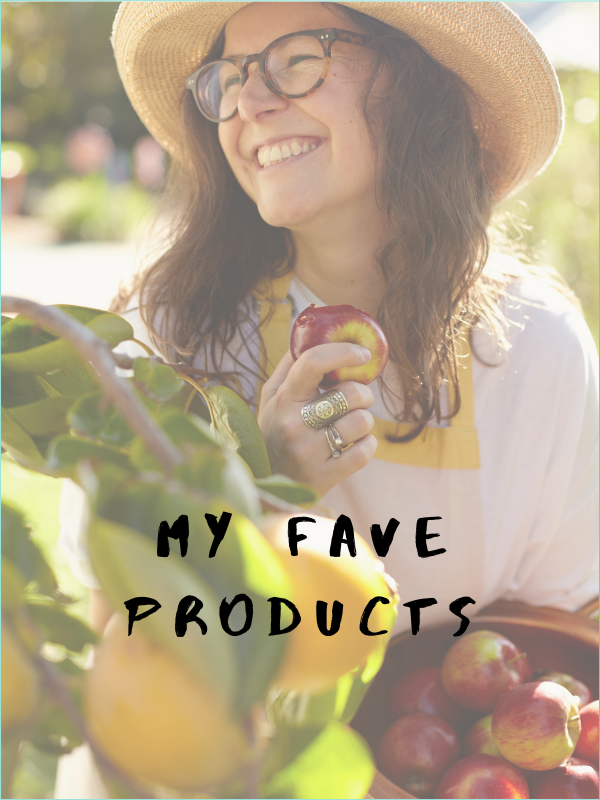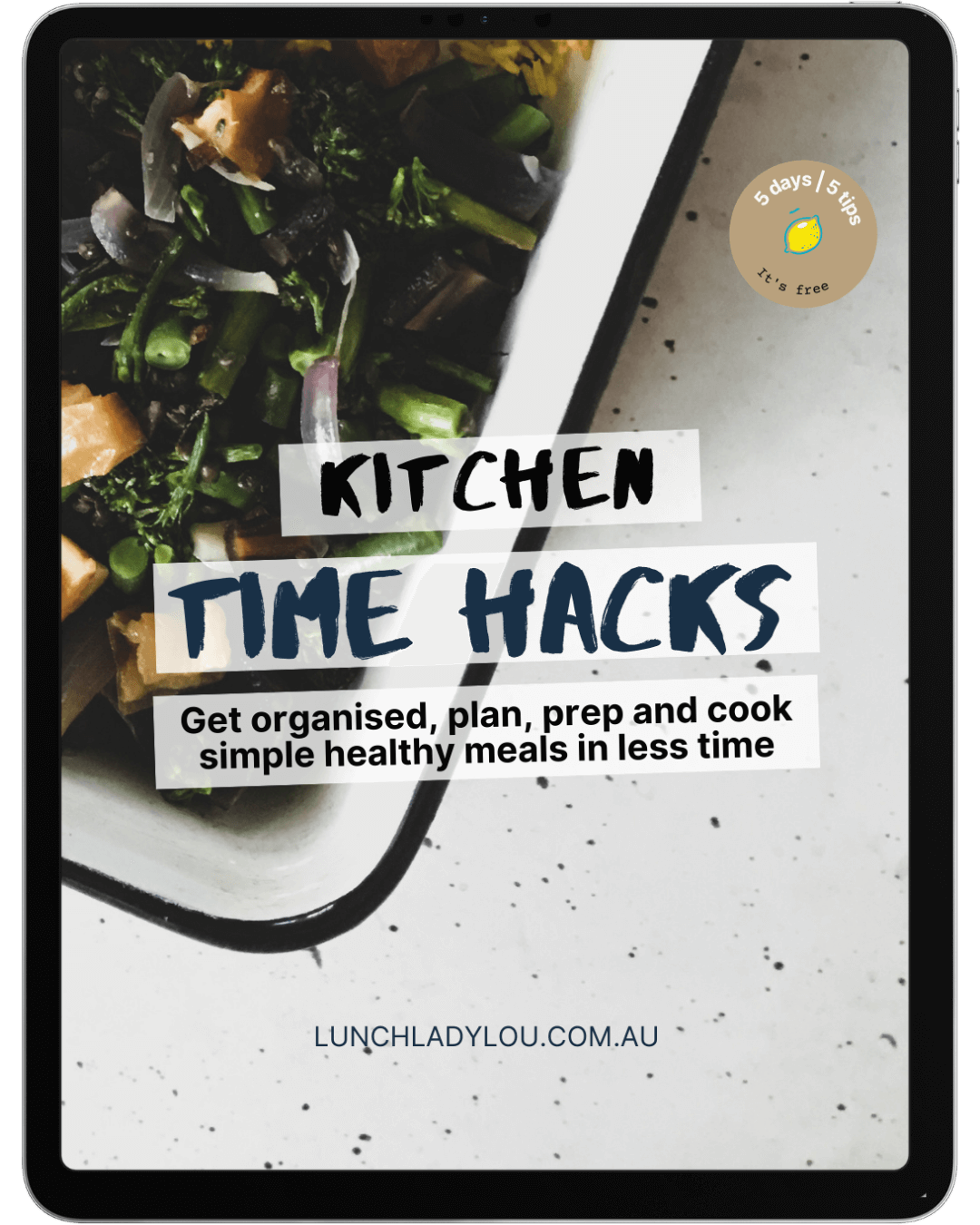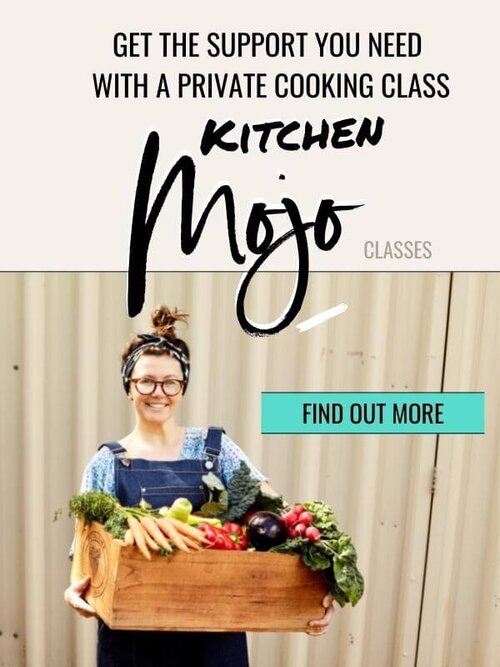Are recipes making you a worse cook?
Say what Lou? Did you mean to write aren’t recipes making me a BETTER cook? I did not.
Recipes can be wonderful.
On my website you’ll find a lot of recipes.
How I’ve learnt to cook? Recipes.
What’s gotten YOU to this point in your cooking knowledge? Recipes.
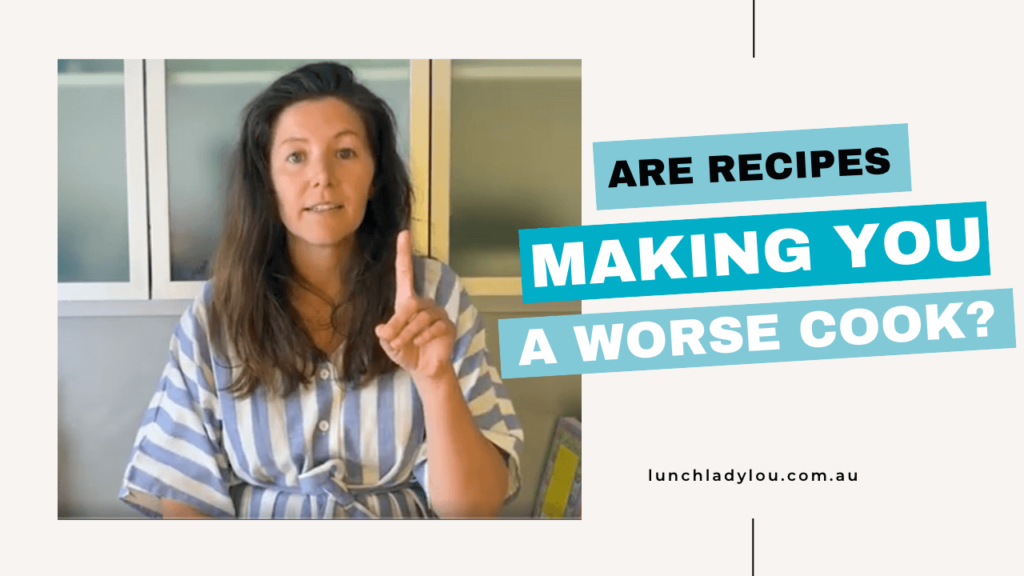
But. there’s a problem. when you blindly follow a recipe without taking into consideration your personal circumstances – there’s a big potential for a big problem.
– Recipes can keep you wanting more and feeling like you’re in a recipe rut because you can’t adapt.
– Recipes (almost always) take more time. You need to read them, follow them, refer back to them.
– They can cost you a lot more money on your groceries because you’re eating out of season.
– They can make you waste food because you buy new produce instead of using what you have.
Watch the video
Read the transcript
Welcome back to today’s episode: Are recipes making you a worse cook?
Recipes can be wonderful. On my website, you’ll find a lot of recipes.
How I learnt to cook? Recipes.
What’s gotten to you to this point in your cooking? Career, life, whatever you want to call it, recipes.
But there’s a problem here. When you blindly follow a recipe without ever taking into consideration things that are going on in your kitchen, how it fits into your schedule, that you have chicken legs over chicken thighs. That you don’t like mince in your spaghetti bolognese and you’d prefer something else.
When you have all these underlying niggles and preferences, it comes out as I’m in a recipe rut. I am in a desperate recipe rug. I need you to tell me new recipes. I’m going to go into this Facebook group and ask others for their best, quick, nutritious, healthy, doesn’t take a lot of time. Must feed everyone in my family. Did I mention fits into a budget? All of the criteria. And please help me because meal kits aren’t working. Takeaway isn’t working, this isn’t working, this isn’t working, this isn’t working. But I kind of don’t want to take any responsibility for it. I just want whoever is going to read this post to tell me exactly what I need to do, and I’m probably gonna apply the littlest effort ever, and it’s going to fail. Okay, a slight exaggeration for my audience but it does happen a lot.
The problem that I see that I’ve experienced, that my clients have experienced and that I’ve helped them move out of is that recipes my dear friend, can keep you more stuck, more stressed, more overwhelmed. And constantly searching for new recipes, new everything, new ways to do things, blah, and they keep you there stuck and they don’t help you move forward.
They’re always keeping you at this like middle level ground. So you’ve probably researched recipes. You have a list of family favourites. You might not call it that. You might call it. You might not even have a name for it, but it’s all the recipes that you have in your head. You might have them written down in a book. You might have them in your phone. You might just have a whole list of them bookmarked that you go to over and over again, and that’s great and it’s gotten you so far that then once you’re in this point, I’m in a recipe rat. I’m stressed. I can’t cook properly. I, I am missing ingredients. I’m so overwhelmed.
It becomes really hard to move out of that because most people don’t really know how to cook. They know how to cook with the recipes that they have. But beyond that, when the ingredients change, when the season changes, when cauliflower becomes $7 ahead or iceberg lettuce becomes $12. They don’t know what to do and they can’t adapt.
And that’s a problem. It’s a problem. Today I wanted to talk about how recipes may be making you a worse cook. And I want to start, well, we’ve been going for a while, but I just want to say this: recipes can be amazing. They can be amazing, but when they’re blindly followed, it takes you out of the kitchen.
And for instance, there’s a lot of blogs and a lot of articles online that say how to spot a good recipe. And this is the whole thing of keeping you savvy and on your toes so you can spot a good recipe. And most likely they just want you to click on their website to find the. Which is fine. But “they should say these things”. It should say, cook your chicken on the skin side down until it’s perfectly brown and crispy. Well, what’s brown and crispy?
And this is where the nuance comes into it. Pop it in your pan, put the chicken in your oven at 180 degrees and cook it for 45 minutes per kilo. Okay, cool. I get my chicken out and it’s burnt on top.
Why? Whoa, there’s something wrong with the recipe. The recipe has led me astray. Don’t go to that site. The recipe, there’s a problem with it. I’ve never had any success and sure, okay, so some people might just be slapping together, recipes all over town but there’s so much responsibility in your hands to make it work for you.
Tor example, The eggplant dip. If you watched a few of these episodes before, you may have heard about the eggplant dip dilemma. I have a roasted eggplant dip recipe on my site, and I was googling my business name like every good business owner does. And I came across a recipe review for my eggplant dip, and this person went into detail about how they were making the recipe and it was well written and blah, blah, blah, blah.
But they thought that I had left out lemon. There was lemon in the recipe, but I didn’t include enough lemon. If it was a tablespoon, I can’t remember how much it was. It needed two tablespoons and they were going to throw the whole dip out rather than add the extra tablespoon of lemon, which sounds so ridiculous.
But this is where, and I think that recipes can get it wrong, me holding your hand in the recipe every step of the way.
Okay? It can be great for education, but what it leaves out is your taste buds, whether you like the dip saltier, whether you want it more creamier. Whether you want it just like straight up eggplant and just eggplant. Maybe you don’t even want lemon. Maybe you want orange or lime, depending on what you’re putting this on top of. Is it like an Asiany inspired dish? You’re gonna go with lime, you’re probably going to add ginger. You might put coriander through it. Okay. If you hate coriander, forget about that.
There are so many parts of a recipe that can be tweaked and made amazing to your taste. That you can’t always get to experience if you’re just following a recipe step by step, by step by step and not paying attention.
You’re just looking at it and then you’re going to do it. You’re not paying attention to your senses at all. You don’t know what you’re learning because you’re not learning anything. It’s just this back and forth and this is what I do and it’s like shutting your brain off and you’re not present in the kitchen.
You don’t even get the relaxing benefits of cooking. You don’t get the creative vibes going. Which creativity is a big benefit of cooking, especially if you have a job where you just like sit at a computer and you’re not using that bit of your brain. We are creative beings and if you tell me you’re not creative, I will tell you that you are lying.
You just haven’t flexed that muscle.
And the other benefit of cooking, believe it or not, is to relax. Pop the tunes on. Okay, you got a toddler screaming, something else is going on. You had a shift. Date doesn’t. It’s an opportunity to relax. It’s to ground back into your home. It’s to do something for you, your partner, your housemates, your family, whoever it is.
And then you reconnect around the dinner table, have a good chat, have a bitch about the day, talk about your boss, whatever it is. And then you get to laugh and you get to enjoy the good food that you’ve made. And feel proud of that. But there are so many benefits that we don’t get when we are so focused on this recipe and following the recipe step by step.
So most of us, as I said before, have not really learned how to cook. We’ve learned via recipes, we’ve maybe memorised some recipes and that’s it. But we have big gaps.
Every recipe is made up of:
- Ingredients. And ingredients applied with.
- A method of cooking. You’ve got a soup, you’ve got a slow cooker, you’ve got a stew, searing on the stove, sauteing, blending it up, steaming whatever it is.
- Apply the ingredients and the method – and you usually get the third part, which is flavour. Flavour can be via the cooking. And it can also be by adding things to ma coriander, lime butter, salt pepper, sesame oil. I can go on basil, pesto, some crazy dressing, and I’ll go on and on and on and on and on.
what is a recipe underneath all of that? It is someone else’s opinion of how that should be cooked.
I catered a beautiful retreat and everyone there was a beautiful cook in their own right. I was so nervous, and I also knew these people, so I was even more nervous. But you know what I learned that day?
Someone else who cooked the exact same thing that I served up, she said, I learned something today because I wouldn’t have done it like that. I would do it like this, but I loved yours because it made me think about things a bit differently, and I could take it away. But then I was so intrigued, with how she would have done it. And this is the beautiful thing. You are the best person to feed you and whoever lives in your home, you are the best person to bring the flavour. Like you like it because maybe you don’t like coriander, maybe you don’t like peanuts, maybe you don’t like goats milk or goats cheese.
There are so many things that you don’t like that I love and vice versa. So if you are constantly looking for recipes, oh, it has zucchini in it. Ah, it has goat cheese in it. Oh, it has this in it, and you can’t figure out how to adapt that to make it work for you. You are losing out big time following a recipe.
Following a recipe slows you down so much. First of all, you need to find recipes. You need to constantly be finding new recipes. You need to store the recipes. You then need to get the ingredients for the recipes.
And okay, the benefit for that is you are buying exactly what you need in that recipe. You’re bringing it home and you’re going to use it. If you follow that process, this is what’s going to happen. But what if you forget an ingredient? What if it’s out of season? What if it’s a beautiful pesto pasta with all of these juicy, fresh summer tomatoes? But it’s dead. Middle of winter. You might go find it anyway, but you know what, it’s going to cost you a lot more.
So what could you make in winter? That’s that kind of pasta. How can you adapt? And so most people, they search for their recipes, then they need to find a trustworthy recipe, then they’re going to buy the ingredients, then they’re gonna make it.
And while they’re making it, they realise they’ve forgotten an ingredient and then they freak out. What do I do? Oh my God, I bought chicken wings instead of chicken. How do I adapt? How long do chicken wings take in the oven compared to chicken legs? And this is just an example. There are so many more examples of that.
What I believe and what I see and what I’ve done and how I’ve catered four hundreds of people per week all on my own is I hacked the recipe system and I created foundations. Well, I figured out that there are foundational themes. Foundational methods underpinning each recipe. And if you break it down to the foundational method, oh my gosh, cooking is free. Cooking is fun. Cooking is relaxing, cooking is creative.
And of course there’s still elements for where you could stuff it up. But this is where things become different because you’re learning about the seasons. You learn about how ingredients work.Frying up potatoes in a pan, like diced potatoes makes awesome crunchy chips.
You could also do that with sweet potatoes, but you can also burn them a little bit easier because the sugar content is higher. So that’s just something that I learned many, many years ago when I was recreating one of my Mum’s recipes. But you know what? I probably wouldn’t have gotten that from reading a recipe. I had to get in the kitchen and stuff it up and make it, and then fix.
And following a recipe, you are so scared of stuffing it up. Because it feels like, oh, how could I be so stupid either to follow this recipe that’s led me astray? Or how could I be so stupid that so many people are having success with this recipe and I’ve stuffed it up because I’m just a shit cook. Or whatever version of the story you’re telling yourself.
And so you stay stuck in this spot cause you don’t want to move. But cooking without a recipe. It almost obliterates that because you become so much more nimble to creating awesome food on the spot with what’s in your pantry, with what’s in your fridge, with what’s in your freezer, with what’s in your fruit bowl.
And it’s like this little mini mission to make it as simple as possible and as flavourful as possible. So back to those foundational methods. You have a soup, you have a stew, you have a dip, you have a dressing, you have a pasta bake kind of thing. Underneath all of those is a method. It’s like a framework. I don’t really like that word framework, but it’s something that you can work off that then it just goes in the direction that you want it to go. So I want to go into a few pros and cons of recipe. Well, actually, let’s start with a story. I have a Thermomix. The brand new one the TM6.
It’s amazing. It has a guided recipe function. Thought I’d never use it. I love it, but I don’t cook meals in my Themi. Maybe on two hands. That’s how many meals I’ve cooked in it in a year. But what I use it to do is be the extra pair of hands in the kitchen. I need the sourdough. I need the pizza dough. I make flatbreads. I caramelise my onions every week. I make porridge in big batches. I caramelise carrots. I can steam my veggies. And what I love about that is that it’s out of the way the themi is on, it’s got it under control. I don’t need to watch the gas stove. I don’t need to worry about little toddler hands reaching up and touching all the knobs and I can chop veggies for the. I can make a cake with the toddler. I can go outside, I can come back in, I can do whatever I want. I can be doing other cooking things, right?
But this one morning, I didn’t have access to the guided recipe process of making porridge, and I have porridge recipes on my website. I have one that’s in Vogue. I have porridge recipes, but I’ve been blindly following this Thermomix one. Pressing the buttons. Next up, next up, next step following this recipe. And I got to this particular morning where I didn’t have access to this guided recipes.
And I drew a blank, oh my God, how do I make this? And I was laughing at myself thinking it’s a two ingredient thing. I know it’s oats and I know it’s water but I don’t remember the ratios. I can’t remember anything right now. What am I going to do? I laughed at myself in that moment thinking, oh my God, I’ve been taken for a ride, a recipe ride, and I’ve come out worse from this.
And you could say, look on the back of the packet, Lou, but I don’t have a packet because the oats are in my jars. What did I do? Well, I laughed.
The day I got my Thermomix and I used the guided recipe function for the first time, and I messaged my friend and said, oh my God, this guided recipe function is going to save so many households around the world so much stress and heartache and pain.
And it’s also going to potentially decimate people’s skills all over the world because they’re just stuck in the recipe of following step by step. I love Thermomix. I love the guided recipe function. I love recipes. I create recipes. I have them on my website. Some might be going soon because I don’t think that they’re all doing you any good, which is another story for another day.
But they need to work together and putting your full reliance on a recipe and being in this stressed always searching for new recipes rut. If it’s feeling like that. Something’s got to change and something can change. And it might be learning how to ditch a recipe, learning how to freestyle a little bit.
Learning how, learning the how and the why behind a recipe that you are working with. So even then you can be like, oh, I understand we’re putting this chicken in, we’re going to put the chicken skin side down, and I want, you know, the aim of the game here is to get that skin nice and crisp. And then I’ve got a crispy skin, and then I can pop it in the oven and then it’s going to cook the meat.
It’s thinking those things that aren’t always written in recipes and they don’t have to be, so a recipe, you might think it throws you under the bus, but when it gets it wrong, when you get it wrong, when it’s wrong, whatever way you wanna look at it:
- Your oven might run hotter, your oven might run cooler.
- You might have amazing conductive pans that heat a pan so much that you never even need to put it on a medium heat. And if you have it on a low heat for too long, it’s like a super hot heat.
- You might have pans that are so crap. They don’t conduct heat at all, which means if you have it on a medium, it’s really a low, which means a recipe is going to be wrong for you. You probably might need to crank it up to a high then have it at a medium.
Does this make sense? I hope so. Because there are so many nuances within the kitchen and within ingredients that can stuff up a recipe without it being you or me and your skills and this and that and blah, blah blah. It might just be that your oven runs hot and that comes back to you to adapt the recipe.
And this is why I really believe that we all need to be able to freestyle and ditch the recipe a little bit more.
This is the end of ‘Are recipes making you a worse cook?’
Thank you for watching, and I’ll see you soon.
